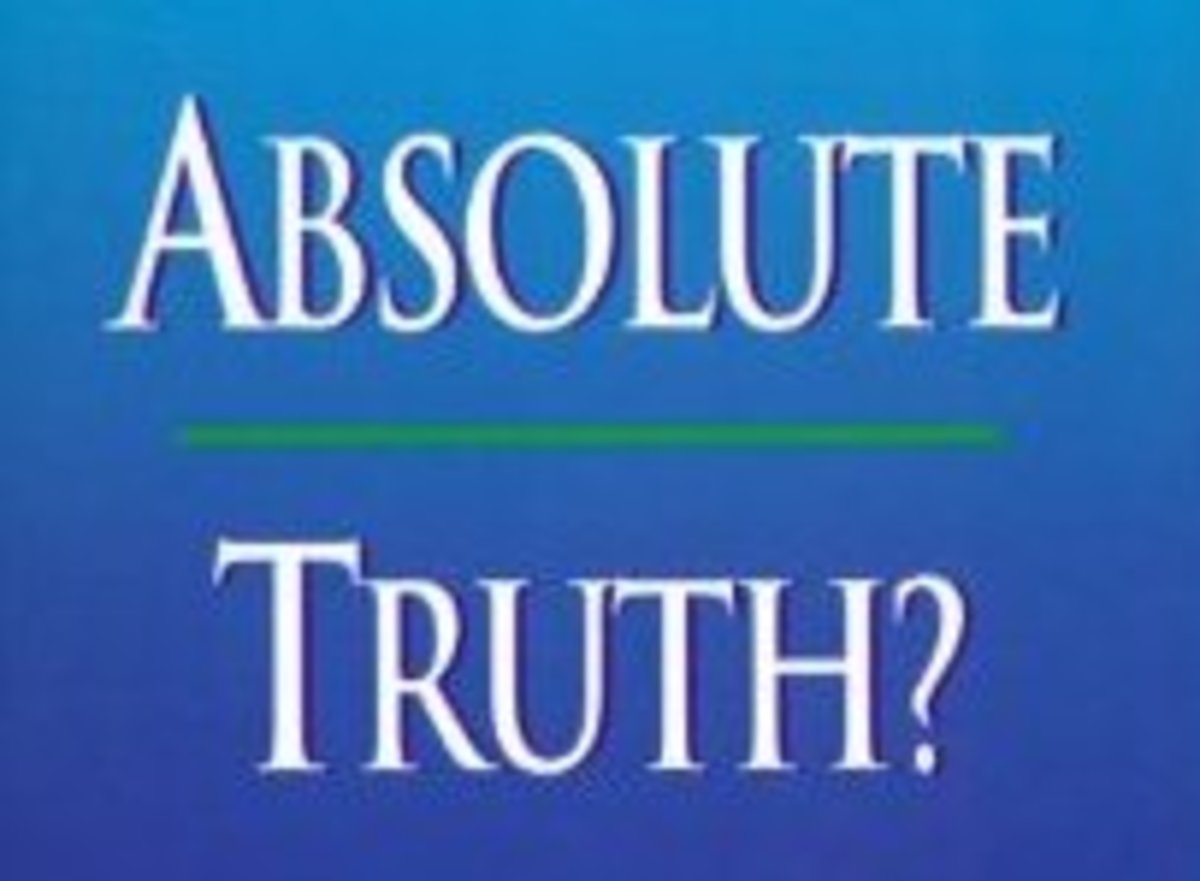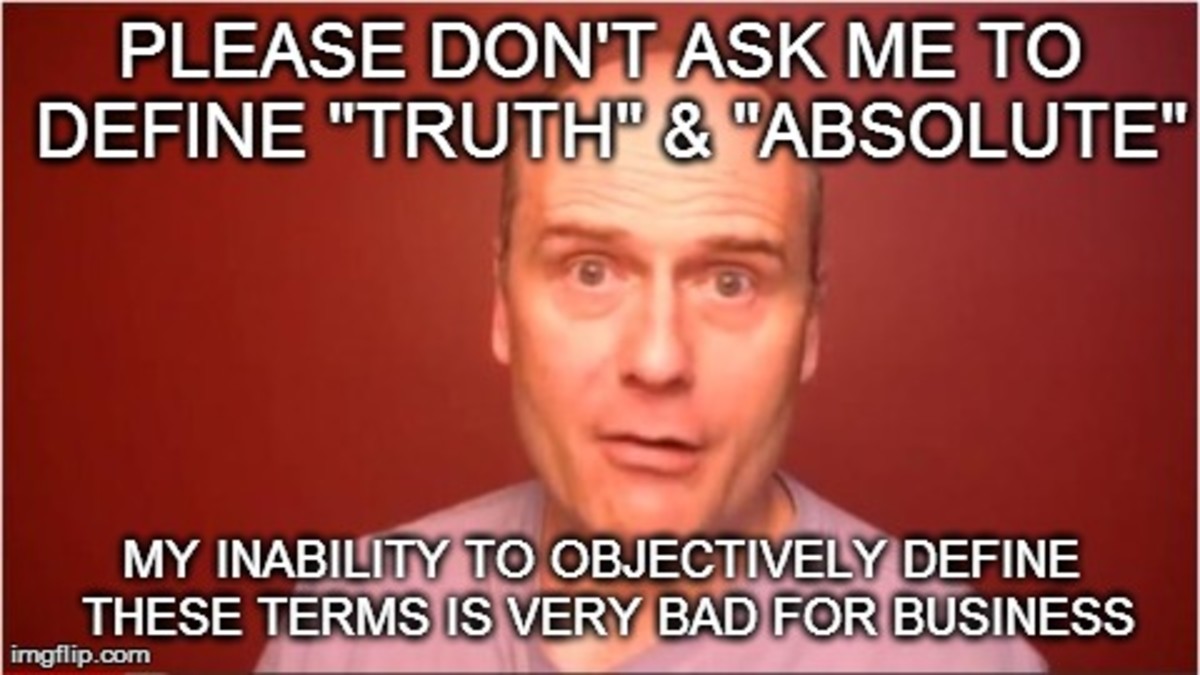Philosophy Essay on the True, the Good, the Beautiful, Part I: What is TRUTH?
The True, the Good, and the Beautiful have long held my attention as something I wanted to explore more deeply. We all have wondered at some point or other, "What is truth?" With that has been a desire for goodness --if it was attainable-- and a longing for beauty in our lives, weather it be a spiritual, physical, emotional, or mental quality. This is the first of a many-part series on each of these topics and how they relate to each other. Below is the position I hold as a result of my research and which I will attempt to prove to you through these essays.
God’s attributes of truth, goodness, and beauty are essential qualities peculiar to the Christian worldview, and are a major dividing point between the Christian worldview and other worldviews.
A major battleground has arisen in the area of value judgments. Those of the postmodernist worldview claim the values of truth, goodness, and beauty are subjective to the meanings and uses each person wants to give them, and are relative in value according to the personal benefit each receives. Those of the modernist worldview believe that absolute truth in every area can be found by using the ability of the intellect. The contrasting Biblical Christian worldview presents a standard capable for attributing absolute values to the three areas of Truth, Goodness, and Beauty --for only an absolutely true, absolutely good, and absolutely beautiful Being could ever produce the qualities of truth, goodness and beauty. However, the effects of the modern and postmodern views have been devastating to culture, and have sought to destroy the possibility that anything absolutely good can exist. But with God’s standard as the foundation for all things Truth, all things Good, and all things Beautiful, the culture can face a more hopeful future.

You may be interested in...
- Is There an Absolute Good?
Part II of this series on Truth, Goodness, and Beauty. - The Beauty of Holiness
Part III of this series on Truth, Goodness, and Beauty.
I. Truth
“What is truth?” Pilate asked Jesus. Jesus had just told him that all who were of the truth would hear His own voice, and that He was born into the world for the very purpose of bearing witness of the truth.
Today people still inquire about truth. They ask where to find it, how to find it, if it even exists. Now some people are even declaring that the only truth there is is the truth that there is no truth. This is the postmodernist or utilitarian viewpoint, which also declares that “truth” is whatever works for an individual, regardless of a contradicting “truth” that may be working for a different individual. Some have even mistaken the absolute truth of the Bible for personal and experiential preference, such as W.C. Smith did, when he said:
“Christianity is not true absolutely, impersonally, statically; rather it can become true if and as you or I appropriate it to ourselves as true and interiorize it insofar as we live it out from day to day. It becomes true as we take it off the shelf and personalize it in actual experience.”
However, most people today take a statement for truth if it has enough agreement with other truths that have long been considered fact by common sense, or if a general agreement has been reached by experts on the subject. Most people think that the world’s “collection” of settled truth has grown over the centuries, as new minds have entered the scene and new scientific discoveries have added chapters to the textbooks. Mortimer Adler, who seems to follow this modernist philosophy (that all truth can be found by man’s reason), explains this in his book, Six Great Ideas:
We should never rest satisfied with anything less than the agreement of all (about matters concerning which common sense is competent to judge), or of all who are experts (about matters belonging to special departments of knowledge). Unanimous agreement is the appropriate condition of the human mind with regard to anything that is a matter of truth rather than a matter of taste.
Such a view on truth can never be “true truth,” a term used by Francis Schaeffer for absolute, changeless truth; for the very method of finding truth involves finite people who are easily misled by:
1. Their own senses that give false impressions. (Example: mirages)
2. Their own prejudice, or the prejudice of authorities or experts on a topic who refuse to accept the truth because the truth might reveal a God who they must submit to. (Romans 1:18-19)
3. Satan, the deceiver, who is the father of lies. (John 8:44)
In addition to being misled by something we take as an authority in the matter, we are also misled by the idea that unanimous agreement about all truths is attainable. How much of a majority determines whether something is true or false? Can it only take a 51% majority to determine truth? What if something is determined to be true by the majority in the fourteenth century, but in the twenty-first century is determined by the majority to be false, as many scientific theories have been? And how do we know that the things we consider to be truth now by the majority in agreement will not be disagreed upon a century later? Unless there is a higher authority that really knows what is truth (a tertium quid, as C.S. Lewis named it), it will be difficult to determine absolute changeless fact reached merely by a “majority in agreement.”

How Personal Tastes Relate to Truth
A discussion of truth must also discuss tastes, for many people make decisions based upon what they like or dislike. We know each person has unique likes and dislikes which do not require the agreement of the majority to determine. Are statements about personal taste absent also from dependability on a higher authority? We may make statements about our feelings: I feel contented, or I don’t like the taste of mushrooms, or I like the color green. However, God knows the truth about every person’s desires and dislikes better than the person himself. Because He is the Creator, He knows the individual quirks, needs, and preferences of each person.
Likewise the Spirit also helps in our weaknesses. For we do not know what we should pray for as we ought, but the Spirit Himself makes intercession for us with groanings which cannot be uttered. Now He who searches the hearts knows what the mind of the Spirit is, because He makes intercession for the saints according to the will of God. (Romans 8:26-27)
The superiority of the “tertium quid” truth of God over the truth of the “majority in agreement” is evident here, for there is no majority that can discern the truth about a man’s inner feelings as God can. Even "personal preference" is guided by the Creator who decided before time what each individual's unique likes and dislikes would be.
The Only True Truth
The truth of God has never changed, though the factual conclusions that man has reached over the ages change frequently. God’s truth is always true, and even if many people disagree with it, that does not change the fact that it is the accurate, unchanging fact of the way things really are, which is what truth is. God’s truth is always related to the eternal: that which will never cease to exist, for the entirety of God’s word is truth and will endure forever (Psalm 119:160).
Though God’s truth is the only everlasting truth, there are several obstacles in the way of man understanding it. First, His truth encompasses all things, “reaches to the clouds” (Psalm 108:4), is “founded forever” (Psalm 119:151-152), is the “entirety of God’s word” (v. 160), “unsearchable” (Romans 11:33) in its greatness. The mere fact that God is the Creator of all things, and that His truth encompasses all the things He has created, shows us the massiveness of His truth. We are minuscule and finite in our knowledge, and even if we were to be told every “fact” of truth that there is, we could not understand nor remember even a small fraction of it. We still repulse the idea that there is truth out there that we may not know; or even that there could be and ultimate, God-sized standard of truth that we may not grapple with.

We Cannot Determine Our Own Truth
Second, we are fallible and wicked. Though God has given all men a knowledge of Himself that is manifest in them, man has suppressed these important truths about God in unrighteousness. We have all suppressed truth when we deny that it is impossible to know that even God has the truth. Yet how can we say that: we who do not possess absolute knowledge of the truth and aren't even close to attaining it? We have no excuse, for we know we would be immature babes if we ever did come face-to-face with a Being who possessed absolute truth. Jesus saw that the Jews in Palestine had suppressed the truth as well:
“Because I tell you the truth, you do not believe Me. Which of you convicts Me of sin? And if I tell the truth, why do you not believe Me? Most assuredly I say to you, before Abraham was, I AM.” (John 8:45-46)
His last statement was a powerful and daring thing to say to Jewish leaders, for they knew from history the great esteem God held in His title of eternal changelessness: “I AM”. In this title He was declaring His ownership of the everlasting, changeless Truth. He was truth Himself, reality itself, a Being that was absolute and not “becoming.” “I am the Way, the Truth, and the Life. No one comes to the Father except through Me.” (John 14:6). In spite of such a blatant declaration, the Jews would still not believe He spoke the truth. He explained their prejudice to them:
“You are of your father the devil, and the desires of your father you want to do. He was a murderer from the beginning, and does not stand in the truth, because there is no truth in him. When he speaks a lie, he speaks from his own resources, for he is a liar and the father of it.” (John 8:44).
The contrast between the Father of truth and the father of lies is very clear here. Those who believe the words of Jesus believe the truth. Those who believe the words of the devil believe lies.
However, those who believe lies are not always aware that they are being deceived. When the truth is suppressed, one becomes a child, “tossed to and fro and carried about by every wind of doctrine, by the trickery of men, in the cunning craftiness by which they lie in wait to deceive.” (Ephesians 4:14). These also have their “understanding darkened, being alienated from the life of God, because of the ignorance that is in them, because of the hardening of their heart; who, being past feeling, have given themselves over to licentiousness, to work all uncleanness with greediness.” (vv. 17-19) Though he may profess a desire to know the truth, and even “heap up for [himself] teachers” to give himself assurance that the majority of professionals believe this way; yet he will be “always learning but never coming to a knowledge of the truth.” His opinions will always change. He will turn from the truth he says he desires, and put his trust in man’s fables. (2 Timothy 3:6-8, 4:3-4).
This is not to say that the advice or facts learned by “heaps” of teachers are always false. Some true Truth may satisfy the modern qualifications of the “agreement of the majority” and actually be preferred by most people. For example, there is not much debate now about some very important truths in the area of ethics and moral actions (an example of this is the fact that we all believe Hitler was morally evil). The Bible supports the fact that, even though much truth is suppressed, some will still retain a bit of the general truth which God has graciously revealed to all men, and some will come to a knowledge of the truth in some areas of life. The nature of truth is such that all truth will eventually come to light and prevail, for it is absolute and unaffected by changing opinion.
True maturity in wisdom and knowledge comes when a person knows the God who possesses truth, being “grown up in all things into Him who is the head, Christ.” (Ephesians 4:15). His teacher is Christ, and his desire is purely for the truth of God. When a man’s mind has been “purified in obeying the truth” (1 Peter 1:22), he will see that the supposed “truths” that multitudes of worldly teachers try to promote are nothing but fables and will fall away over time.
Consequences of Suppressing the Truth
This discussion of truth becomes more important when we see that many people today are believing great untruths which have disastrous results.
When God’s truth about the foundation of the world is suppressed, we see consequences in how people treat each other, for if man was not created in the image of God for His glory, then there is no reason to refrain from treating humans like animals.
When God’s truth about right and wrong is suppressed, we will see consequences in economics: for if personal property is not respected, money will be devalued and taxes will increase for the personal gain of the government. We also see effects in politics, for politicians will orient themselves with whatever the majority or mob decides is true and good, or with whatever position will help his career.
When God’s truth about man’s sin nature is suppressed, we will see consequences in education, for it pleases the majority to believe that children are inherently good and do not need discipline, and children grow up acting upon the fallacy that whatever they choose to do is right.
When God’s truth about the design for men and women is suppressed, we will see decline in families: for there is no reason for the woman not to leave her children with others and join the pressure of toiling for food, though she was designed and created to nurture and train her precious children. And we will see decline in the true diversity of marriage, for there is nothing to stop a man and a man from joining together just as easily as a man and a woman, and this prevents the woman and the man from complementing each other through their unique design. This was the prophetic curse in Romans 1:24-32 for the people who suppressed the truth: men and women would leave God’s natural design for them, and rebel against Him by misusing their bodies.
People wonder why suicide rates are skyrocketing, why politicians don’t keep their word, why more school massacres have occurred in the past decade than in any other time in America’s history, why divorce is tearing families apart, and why children don’t behave. This is the state of the world today and this is the result of ignoring the truth of God.
This is also what Satan’s goal for the world was. He is the father of all lies, and is untruth itself, for lies have no other beginning (John 8:44). His goal is to tear apart God’s glorious creation through tearing apart the very foundational truths that established it. However, there is a positive side to this discussion of the truth.

The Blessings of Knowing the Truth
When God’s truth is understood and obeyed, there is great blessing and fulfillment.
A man who has the truth is able to:
- Dwell with God: He who [dwells in Your holy hill] walks uprightly, and works righteousness, and speaks the truth in his heart. (Psalm 15:2)
- Be sanctified (set apart to purity): Sanctify them by Your truth. Your word is truth. As You sent Me into the world, I also have sent them into the world. And for their sakes I sanctify Myself, that they also may be sanctified by the truth. (John 17:18-19)
- Know God: And this is eternal life, that they may know You, the only true God, and Jesus Christ, whom You have sent. (John 17:17)
- Have great joy: For I rejoiced greatly when brethren came and testified of the truth that is in you, just as you walk in the truth. I have no greater joy than to hear that my children walk in truth. (3 John 1:3-4)
- Have fruitfulness of life: For the fruit of the Spirit is in all goodness, righteousness, and truth.(Ephesians 5:9)
- Have protection from evil: Stand therefore, having girded your waist with truth. (Ephesians 6:14)
- Have freedom: Then Jesus said to those Jews who believed Him, “If you abide in My word, you are My disciples indeed. And you shall know the truth and the truth shall make you free.”(John 8:31-32)
How can the truth be understood? As we discussed before, God has given a foundation of truth to each person, disclosing to them His invisible attributes. The greatness of God’s truth makes it impossible to attain with man’s own efforts, and the sinfulness of our minds prevents us from doing much more than suppressing the truth. But the word of God provides hope for the truth to be known:
1. God grants knowledge of the truth through repentance and salvation through Jesus Christ.
God our Savior, who desires all men to be saved and to come to the knowledge of the truth. For there is one God and one Mediator between God and men, the Man Christ Jesus. (1 Timothy 2:4-5)
[A gentle servant must] in humility correct those who are in opposition, if God will perhaps grant them to repentance, so that they may know the truth. (2 Timothy 2:25)
2. The Spirit of Truth who teaches the truth will be given to believers to instruct even after the moment of salvation.
And I will pray the Father, and He will give you another Helper, that He may abide with you forever, even the Spirit of truth, whom the world cannot receive, because it neither sees Him or knows Him; but you know Him, for He dwells with you and will be in you... But the Helper, the Holy Spirit, whom the Father will send in My name, He will teach you all things, and bring to your remembrance all things that I have said to you... Nevertheless I tell you the truth…when He, the Spirit of truth, has come, He will guide you into all truth; for He will not speak on His own authority, but whatever He hears He will speak; and He will tell you things to come.(John 14:16-17, 26, 16:7, 13)
We see that knowing the truth requires a gift from God. God may grant us the ability to figure out some truth, such as how to discern between types of fruit, different colors, what the weather is, how we feel, what we prefer, or even to discover some scientific truth about the world. But the majority of truth, the most important truth that we can never doubt because it is based on the one eternal “I AM,” must come from God Himself in His Word. Then we will be able to govern our ways in God’s everlasting truth.
The principle that God holds in Himself all truth must also require that God holds in Himself all the truth about Goodness, for if there is such a thing as absolute goodness, then this falls under the category of absolute truth. The truth about what is right and wrong, good and bad, is a beneficial truth for humanity to understand, for it is by knowing this truth that lives can be governed. Part II of this series will delve into the truth about absolute Goodness.
© 2009 Jane Grey








